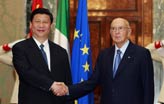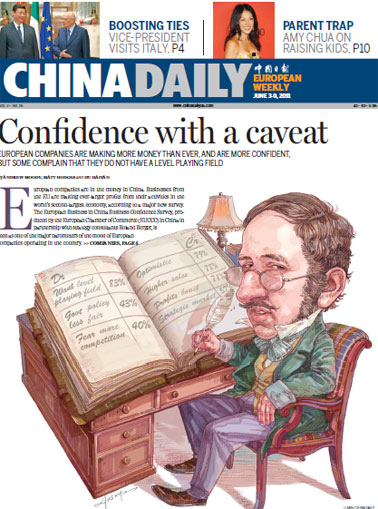Op-Ed Contributors
Time for EU to turn the tide in its favor
Updated: 2011-06-03 10:52
By Zhang Jian (China Daily European Weekly)
European leaders have relied on figures of power in North Africa and the Middle East, such as Tunisia's former president Ben Ali, Egypt's former leader Hosni Mubarak, Libya's current leader Muammar Gadhafi and others, to safeguard the EU's interests and the security of EU nations.
For example, for fear of violent Islamists and the rise of anti-Western forces in the Middle East and North Africa regions, the EU often took the default position and supported local governments.
Egypt had gained the EU's support since it had supported the Israeli-Palestinian peace talks. In recent years, Italy has dramatically reduced illegal emigration from Africa by reaching agreements with Ali and Gaddafi.
Similarly, for energy and economic interests in those areas, several large French companies in Tunisia had close relationships with Ali's personal business group. Some French political figures also have a close bond with political figures in Tunisia.
It is also well-known that Italian Prime Minister Silvio Berlusconi has a close relationship with Gaddafi. Italy is not only relying on Libya to prevent African illegal emigration, it still has considerable economic interest in Libya's oil as well as arms exports to Libya.
However, with some political figures stepping down in the Middle East and North Africa, European leaders have realized that if the EU wants to maintain influence in the region, it must find new paths and new forms of cooperation. In particular, it must create new partnerships with local politicians and political forces.
German Foreign Minister Guido Westerwelle proposed in March that Germany and Egypt and other countries establish "a partnership for transformation".
"We are ready to stand at the side of the democrats," Westerwelle said. "We are willing to assist them in helping build an independent judiciary, providing advice and counsel wherever requested."
Also in March, the European Commission and the High Representative of the European Union for Foreign and Security Policy jointly released A Partnership for Democracy and Shared Prosperity with the Southern Mediterranean. This document outlines three foundations to build a "democracy and shared prosperity partnership": Democratic transformation, civil society development, and a sustainable, yet inclusive economic and social development.
Based on this document, the EU will be actively involved in the transformation of the Middle East and North Africa regions, exporting European political and economic ideals and values to guide the transition process toward democracy. By doing so, the EU will replace its past over-reliance on local government and diplomatic powers with new ways of "comprehensive engagement" for all sectors. In particular, the EU will promote the development of civil society in North Africa and Middle Eastern countries to foster pro-European forces.
E-paper

Harbin-ger of change
Old industrial center looks to innovation to move up the value chain
Chemical attraction
The reel Mao
Improving app-iness
Specials

Vice-President visits Italy
The visit is expected to lend new impetus to Sino-Italian relations.

Birthday a new 'starting point'
China's national English language newspaper aims for a top-notch international all-media group.

Sky is the limit
Chinese tycoon conjures up green dreams in Europe with solar panels
